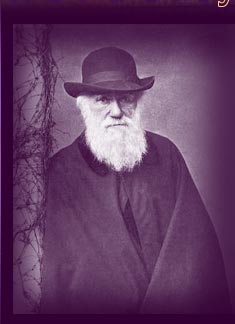












|

Charles Darwin is best known for his notion of natural selection, which holds that those individuals within a species that are best suited to their particular environment will have better survival and reproductive success than others of their kind and will thus genetically pass those advantageous traits to their descendants.
|
 |

1809-1882 Charles Darwin
Darwin's ideas of heredity revolved around his concept of "pangenesis." In pangenesis, small particles called pangenes, or gemmules, are produced in every organ and tissue of the body and flow through the bloodstream. The reproductive material of each individual formed from these pangenes was therefore passed on to one's offspring. In his early research, Darwin believed that the characteristics of one's pangenes were susceptible to change throughout life, so that offspring could inherit traits acquired by their parents during life, but he later eliminated this aspect of his theory.
|
 |